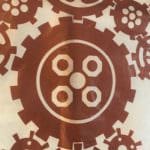 Announcing the publication of our 4th Quarter News Bulletin–with Local Learning updates, calls for submissions, and news about advocacy.
Announcing the publication of our 4th Quarter News Bulletin–with Local Learning updates, calls for submissions, and news about advocacy.
From the introduction, “Linking through Folk Arts in Education:” As I reflect upon 2017 I feel compelled to remember why I am passionate about this small, yet critically engaged, academically rooted, and progressive field of Folk Arts in Education. I stare at the inter-linking gears printed on the vintage kite that sits above my desk and see a metaphor in how Local Learning looks to transform classrooms, enhance intercultural learning, and strengthen communities. We encourage inclusive pedagogy that is at its heart anti-racist and contribute to the creation of educational resources that facilitate greater understanding between students and educators of many cultural backgrounds. The Journal of Folklore and Education showcases programs happening across our nation that create safer and more just and equitable learning spaces and curricula. In the coming year we aim to expand and amplify the linkages between folklore and science (see our 2018 Call for Submissions below), while 2017 provided exemplary ways to engage the topic of literal and figurative links in “Newcomers and Belonging.” We find learning and that which makes us human in the arts, customs, and stories found in our everyday, local, and diverse communities.
As a folklorist, I know that narratives based in racism, sexism, and other ideologies of power and control act insidiously (and often invisibly) in our schools and communities to create fear and division. As a folklorist, I also know that there is power in naming these narratives and to be intentional in illuminating how these narratives have been used to uphold problematic “truths” within communities. As a folklorist, I aim to not be blind to the ways stories, jokes, memes, and other narratives create discord and label unequal groups of “us and “them.” I only hope that as we continue to navigate the current social, cultural, and political terrain that we can make “folklorists” of more people to become better cultural critics of the many stories being served through all fashion of narrative vehicles.
Peace to all our readers and friends in the coming new year,
Lisa Rathje, Local Learning Executive Director
The full text version is available in our News. Also in the bulletin:
